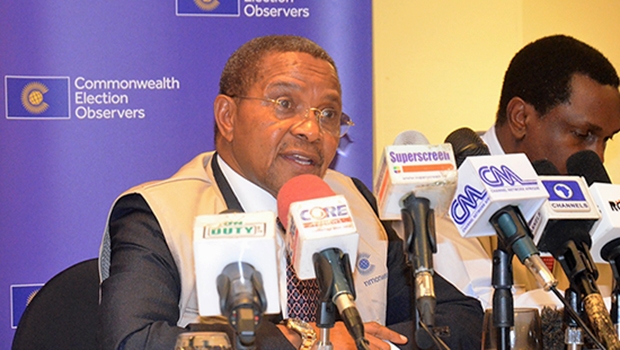There are no products in your shopping cart.
| 0 Items | £0.00 |

 INTERNATIONAL election observers have given Nigeria's presidential and national assembly elections a pass mark saying that they measured up to acceptable global standards despite several hiccups in several states.
INTERNATIONAL election observers have given Nigeria's presidential and national assembly elections a pass mark saying that they measured up to acceptable global standards despite several hiccups in several states.
On Saturday February 23, Nigeria went to the polls to elect a president, senators and members of the Federal House of Representatives. Although there were discrepancies and malpractices in a few states, particularly in Rivers, Bayelsa, Lagos, Anambra and Ebonyi states, they were generally localised and nationwide, the exercise generally went ahead peacefully and without rancour.
Given that Nigeria has 774 local government areas and about 120,000 poling units which dealt with about 73m voters, the observers said the elections were free, fair and credible. According to the Commonwealth Observer Group (Cob), a major gain of the presidential and National Assembly elections was the fact that Nigerians had the opportunity to express their will and exercise their franchise.
In its report, the group noted that in spite of the fact that the elections were highly-contested, the fundamental freedoms of expression, assembly, association and movement were respected. In addition, the observers said the elections showed that the people of Nigeria have demonstrated patience and commitment to their democracy.
They praised the police and security agencies for securing the polling units nationwide but the group asked the federal government to hold those who perpetrated violence accountable. In its interim report, the group pleaded with all political parties to honour the National Peace Accord and avoid violence.
Cob chairperson, Dr Jakaya Kikwete, the former Tanzanian president said: “We had no report of underage voters from observers and the disabled voted and were given preference. Voting was transparent and open at polling unit level
“However, at the collation stage, we did not participate. so it’s the totality of all levels that will determine the overall status. We reserve that until the process is ended.”
Although the Commonwealth observers acknowledged that there were organisational, logistical and technical difficulties in the elections, they said the challenges should be part of the nation’s electoral reform. They added that while the environment was tense and divisive, overall, fundamental freedoms of association, expression, assembly and movement were generally respected.
“We trust that the final stages of collation and announcement of results will be handled in a transparent and credible manner. The people of Nigeria have demonstrated patience and commitment to their democracy and we appeal to them to maintain the same commitment in the post-election period and as Nigeria prepares to return to the polls on 9 March, 2019, for the governorship, state assembly and Federal Capital Territory (FCT) area council elections,” the interim report added.
On violence during the elections, the observers urged the federal government to hold the perpetrators accountable. They advised political parties against taking the laws into their hands in any form and praised the police and security agencies for securing polling units.